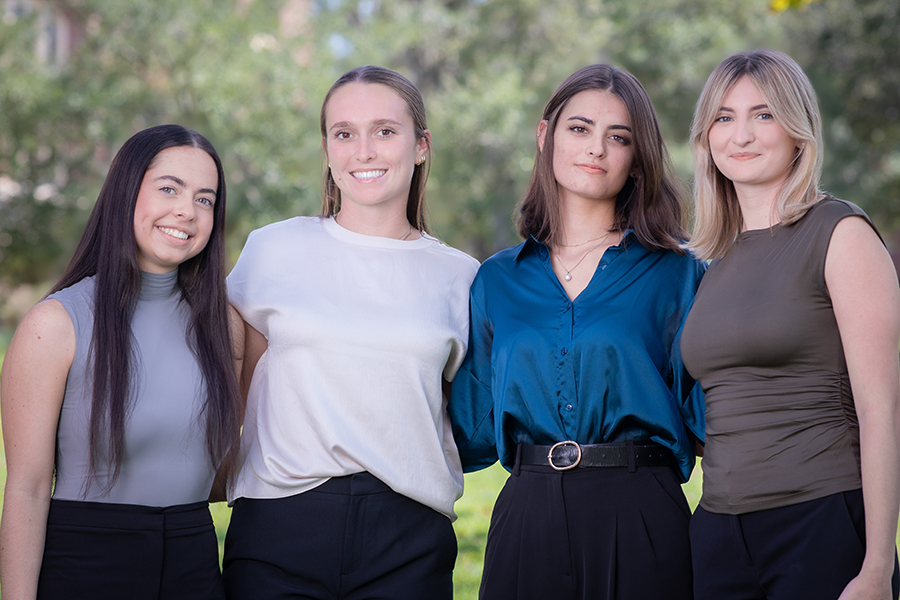FSU student researchers present podcast on Italian Enlightenment culture at 2024 President’s Showcase of Undergraduate Research Excellence

An interdisciplinary team of Florida State University student researchers, all from departments in the College of Arts and Sciences, presented an exploration of culture during the Italian Enlightenment at the 2024 President's Showcase of Undergraduate Research Excellence earlier this month.
“Sip and Connect: Social Networking Italian Style,” is a podcast that investigates social connections of the Italian Enlightenment through a lens of social network theory and was created by Emma Clark, a sophomore double-majoring in political science and philosophy, Angelina Dobbs, a junior double-majoring in neuroscience and English, Kelsie Fernandez, a junior double-majoring in humanities and English, and Colson Gantt, a junior double-majoring in French and international affairs.
“Sip and Connect” explores the strategies that groups of people discussing common ideas used to mediate culture during the Italian Enlightenment, a philosophical and cultural movement that spurred growth in knowledge that spanned the Long 18th Century, which lasted from about 1700 until 1820. The podcast, published on Spotify, examines different cultural components that shaped Italian sociability during the 18th century and considers how these elements embodied Enlightenment ideas.
“Earning the opportunity to share the research and podcasts we worked so hard on was very special,” Gantt said. “I was excited to present our project to other students as well as faculty members at the showcase.”
The team reviewed scholarly articles, books, and first-hand accounts from the period and interviewed experts to inform the 16 podcast episodes, which vary in topic, including “Sewing Culture Stitch by Stitch: Fashion in the 18th Century” and “The Mad Science of Salons,” that delve into the semiotics of clothing design and the role that socialization between the sexes and those of different social class played in facilitating the spread of ideas.
“We were able to branch off into our individual research interests,” Dobbs said. “We cover a wide variety of topics, including coffee culture, journalism, politics, early science, religion, fashion, social etiquette, art and opera.”
Team members initially created individual, separate podcast episodes for Undergraduate Research Opportunity Program projects, through the Center for Undergraduate Research and Academic Engagement, CRE, with all four students mentored by Department of Modern Languages and Linguistics associate professor Irene Zanini-Cordi.
“I suggested that the students apply for an IDEA Grant over the summer to expand the UROP podcast experience into a series,” Zanini-Cordi said. “I mentored them through the grant-writing process and the organization of the summer work-plan for the grant.”
After applying, the students earned $2,000 in funding through CRE’s IDEA Grant program, which fund research, creative projects, and the development or evaluation of new or existing ideas. The award funded the purchase of recording equipment and support to create 12 additional podcasts this summer — the original episodes were recorded at the FSU Global Educational Outreach for Science Engineering and Technology Studio In Dirac Science Library with the help of GEOSET manager Kyle Wilson.
“Earning the IDEA grant for this project allowed me to study abroad in Florence, Italy, through FSU International Programs, which influenced my work,” Fernandez said. “While in Italy, I became immersed in Italian culture. The ability to research and write about the location I was in at the time was special.”
With the grant funding, the team was able to dive deeper into how social connection forged innovative technology and cultural development. For example, Italian coffee culture during the Enlightenment influenced the structure of social hubs, such as coffee shops, where people exchanged views that went on to shape public opinion.
“Though these topics revolve around 18th-century culture, it may surprise a listener to learn how relevant our topics are to contemporary life, especially our episodes highlighting the accomplishments and agency of women in that time period,” Clark said.
Combining their unique yet similar experiences and interests in 18th-century Italian culture, the team framed the episodes around material taught in Zanini-Cordi's course on Italian sociability. In future semesters, Zanini-Cordi plans to use the team’s podcast to assist in teaching the course.
“Our goal was to use the podcast series as pedagogical material for an undergraduate course on the 18th-century,” Zanini-Cordi said. “Each student carried on their own specific research and disseminated knowledge by producing episodes on various topics.”
In addition to the podcast, the team is currently co-authoring, alongside Zanini-Cordi, a peer-reviewed pedagogical article covering their year working on this project, including first-person accounts of the project’s process, that is set to be published in the spring 2025 edition of the Journal for Eighteenth-Century Studies.
“This article will include both Professor Zanini-Cordi’s account of the year and the team’s perspective about our developed understanding of the period and our growth as writers and researchers,” Clark said.
For more information on the 2024 President's Showcase of Undergraduate Research Excellence, visit fla.st/55GSFK4C. To learn more about the Department of Modern Languages and Linguistics, visit modlang.fsu.edu.
